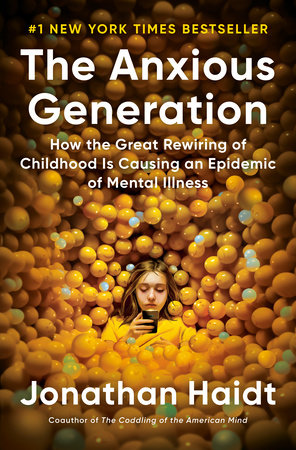“The Anxious Generation” Book Review
Jonathan Haidt’s *The Anxious Generation* is an insightful and data-driven exploration of the surge in mental health issues among today’s youth. The book, which spans 400 pages, delves deeply into the factors that have reshaped modern childhood—particularly, the pervasive use of smartphones and social media. Published in 2024, Haidt examines how these technologies have contributed to what he calls “the great rewiring” of childhood, which he links to a sharp increase in anxiety, depression, and other mental health issues, especially in Generation Z.
Haidt, a social psychologist known for books like *The Righteous Mind* and *The Coddling of the American Mind*, presents a compelling case that childhood has been fundamentally altered by technology, leading to a diminished sense of freedom, lack of social skills, and an overreliance on digital interactions. In *The Anxious Generation*, he extends his prior research on moral psychology and cultural conflicts to address the widespread mental health crisis among youth.
A primary argument in the book is that children have shifted from a play-based to a phone-based lifestyle, and Haidt argues that this change is central to the mental health epidemic. He highlights four key developmental disruptions: lack of sleep, reduced face-to-face interaction, cognitive overload, and addictive behavior driven by social media. These issues, Haidt suggests, are particularly harmful for teenagers who are already vulnerable to social pressures, making social media both a source of connection and comparison-driven anxiety.
Notably, Haidt addresses the criticisms of scholars who believe mental health issues stem from broader socioeconomic and global issues, such as economic instability and climate anxiety. Although he acknowledges these challenges, Haidt contends that the timing of the mental health crisis—beginning in the early 2010s—closely aligns with the rise of smartphones and supports a causal link between technology and youth anxiety. Despite some limitations in the research, he backs his arguments with both correlational and experimental studies, offering a strong, albeit contested, case that the impact of technology is central to understanding current youth mental health issues.
Beyond diagnosis, *The Anxious Generation* offers practical advice for parents, educators, and policymakers. Haidt proposes specific steps to mitigate the negative effects of technology, including encouraging more offline interactions, setting age-appropriate limits on smartphone use, and promoting resilience through structured play. By incorporating advice from mental health professionals and educational experts, the book aims to empower readers to create healthier environments for children in a digital age.
The book has received mixed but generally positive reviews. Some critics appreciate Haidt’s alarm-raising approach and view it as a necessary wake-up call for parents and policymakers. Reviewers from *The Times* and *The Guardian* have praised his focus on actionable solutions, though some question his emphasis on technology as the primary cause of mental health struggles. Others, including critics in *The New York Times*, suggest that while Haidt’s concerns are valid, the full scope of youth anxiety might be more complex than just technology.
Overall, *The Anxious Generation* is a timely and provocative book, addressing a rapidly growing concern in our society. With a clear and engaging writing style, Haidt appeals to readers seeking to understand and tackle the challenges facing young people in a digital age. Despite some contested points, the book offers a vital perspective on how we might begin to safeguard future generations from the unintended consequences of modern technology. I would rate the book 4 out of 5 stars, as it combines rigorous research with practical solutions, though it sometimes leans too heavily on technology as the main explanation for a multifaceted issue.
For parents, educators, and anyone concerned about the well-being of today’s youth, *The Anxious Generation* is a valuable resource.



